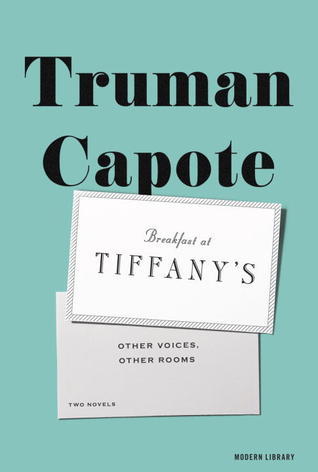What do you think?
Rate this book


304 pages, Hardcover
First published October 28, 1958



Her bedroom was consistent with her parlor: it perpetuated the same camping-out atmosphere; crates and suitcases, everything packed and ready to go, like the belongings of a criminal who feels the law not far behind.
“You’re wrong. She is a phony. But on the other hand you’re right. She isn’t a phony because she’s a real phony. She believes all this crap she believes. You can’t talk her out of it. I’ve tried with tears running down my cheeks.”
I don’t mean I’d mind being rich and famous. That’s very much on my schedule, and someday I’ll try to get around to it; but if it happens, I’d like to have my ego tagging along. I want to still be me when I wake up one fine morning and have breakfast at Tiffany’s.
"If she was in this city I'd have seen her. You take a man that likes to walk, a man like me, a man's been walking in the streets going on ten or twelve years, and all those years he's got his eye out for one person, and nobody's ever her, don't it stand to reason she's not there? I see pieces of her all the time, a flat litle bottom, any skinny girl that walks fast and straight--...
It's just that I didn't know you'd been in love with her. Not like that."




"Never love a wild thing, Mr. Bell," Holly advised him. "That was Doc's mistake. He was always lugging home wild things. A hawk with a hurt wing. One time it was a full-grown bobcat with a broken leg. But you can't give your heart to a wild thing: the more you do, the stronger they get. Until they're strong enough to run into the woods. Or fly into a tree. Then a taller tree. Then the sky. That's how you'll end up, Mr. Bell. If you let yourself love a wild thing. You'll end up looking at the sky."




"it's better to look at the sky than live there; such an empty place, so vague, just a country where the thunder goes and things disappear."
"Anyway, home is where you feel at home. I'm still looking."
"You've got to be sensitive to appreciate her: a streak of the poet. But I'll tell you the truth. You can beat your brains out for her, and she'll hand you horseshit on a platter."
"Never love a wild thing, Mr. Bell,"
"Don't wanna sleep, don't wanna die, just wanna go a-travelin' through the pastures of the sky."
"and believe me, dearest Doc -- it's better to look at the sky than live there. Such an empty place; so vague. Just a country where the thunder goes and things disappear."

“Paramount double-crossed me in every way and cast Audrey.”

Playboy: "Would you elaborate on your comment that Holly was the prototype of today's liberated female and representative of a "whole breed of girls who live off men but are not prostitutes. They're our version of the geisha girl."?Breakfast at Tiffany's excels in imagery, the prose lyrical. It has many layers to it. Abandonment, loneliness, the need to belong and yet not be chained at the same time, the delight in the unorthodox and not loving a wild thing.
Capote: "Holly Golightly was not precisely a callgirl. She had no job, but accompanied expense-account men to the best restaurants and night clubs, with the understanding that her escort was obligated to give her some sort of gift, perhaps jewelry or a check ... if she felt like it, she might take her escort home for the night. So these girls are the authentic American geishas, and they're much more prevalent now than in 1943 or 1944, which was Holly's era.."?




